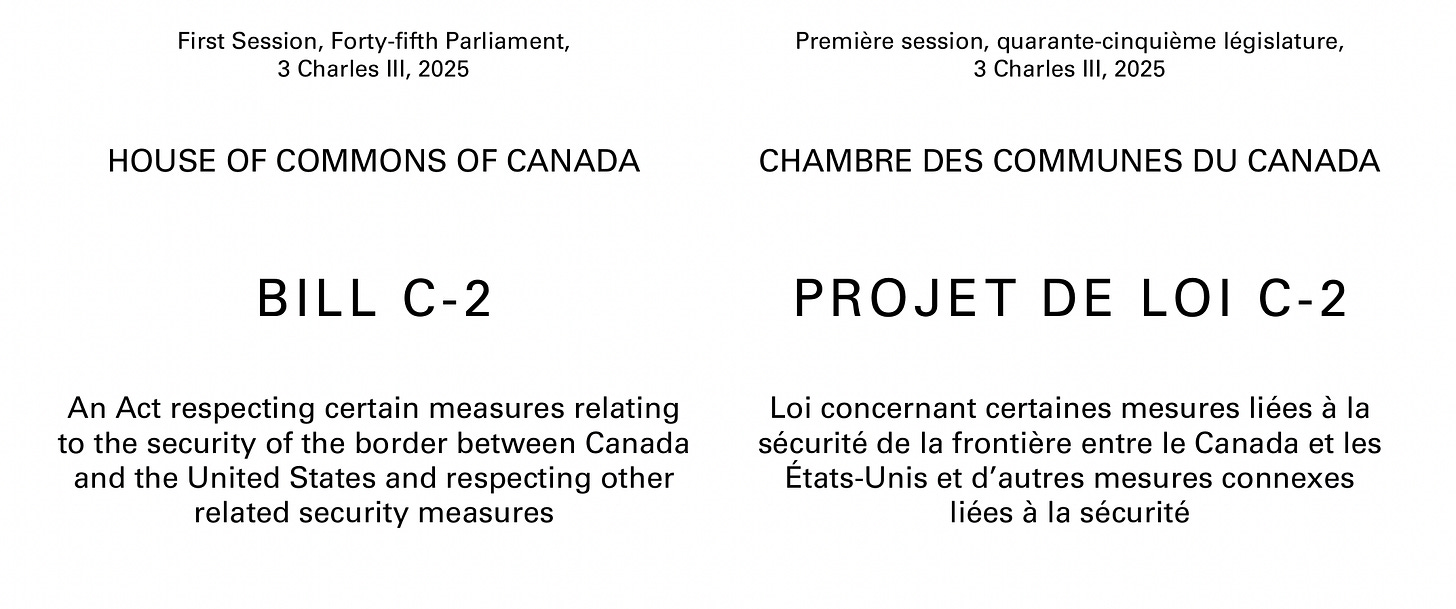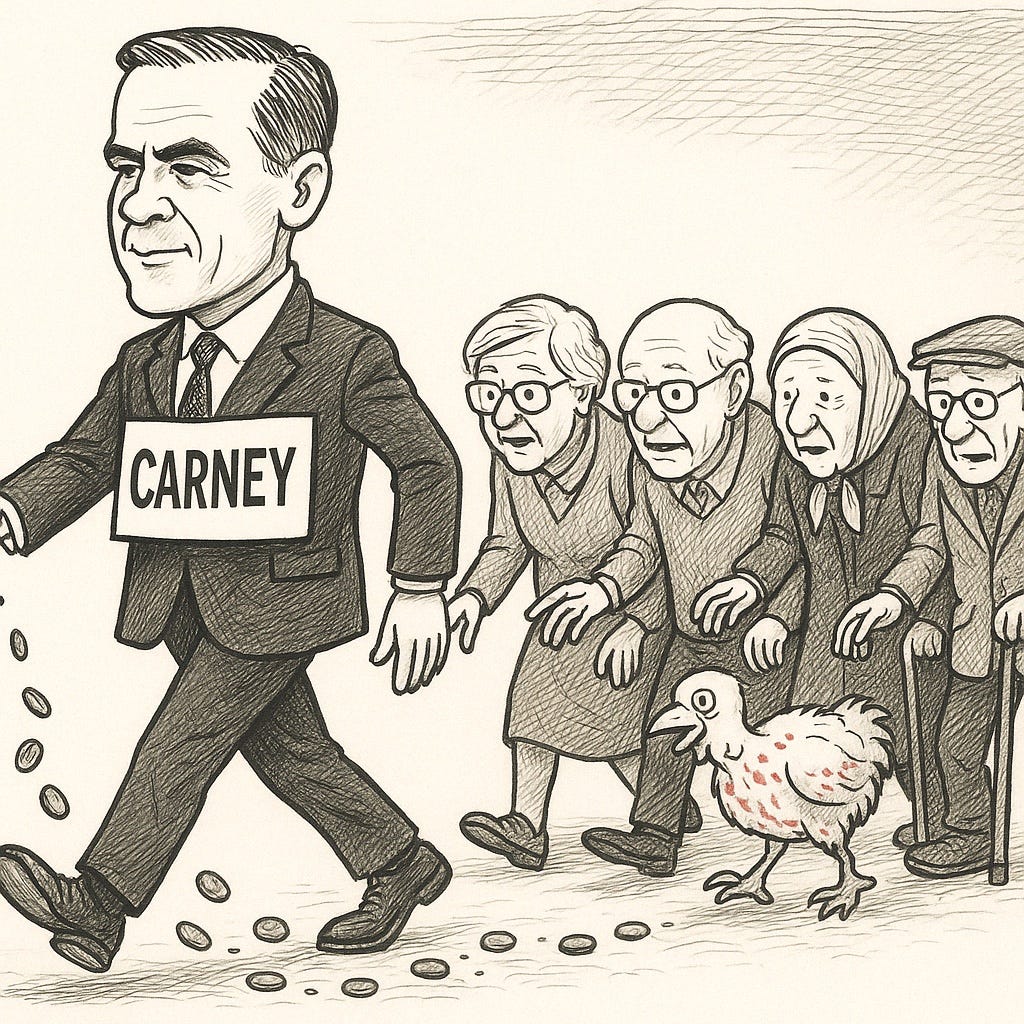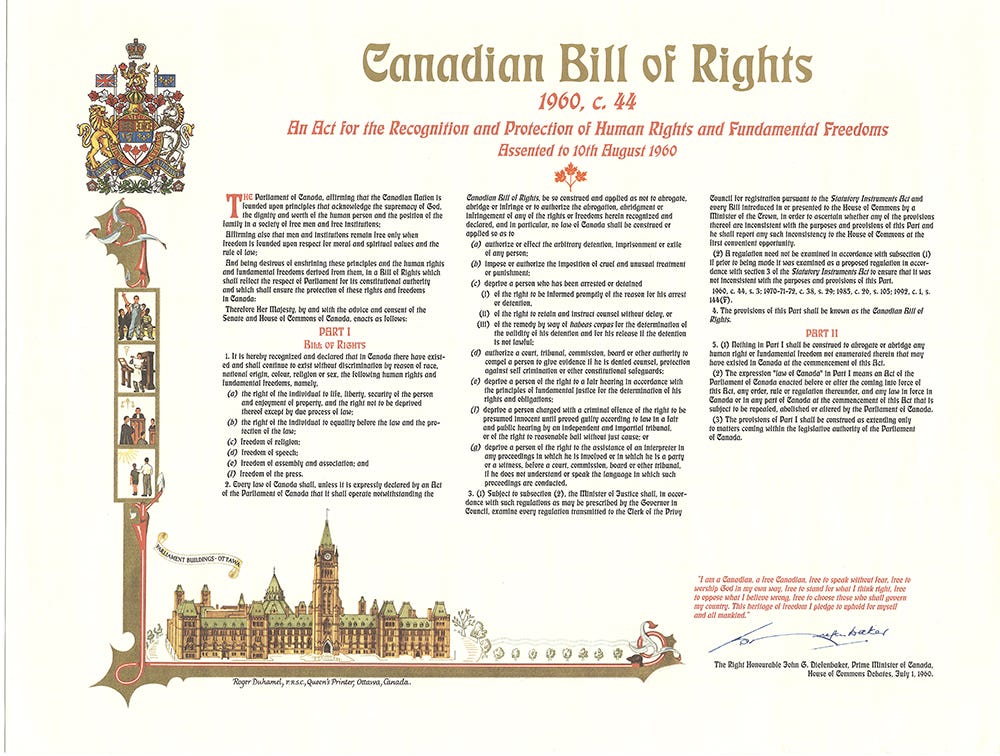Borderline Tyranny: How Bill C-2 Advances the Global Control Grid
Why Canadians Must Wake Up to the Coordinated Assault on Sovereignty, Freedom, and Basic Human Dignity
CLICK ON THE IMAGE ABOVE AND READ EACH LINE…ALL 140 PAGES
Bill C-2 An Act respecting certain measures relating to the security of the border between Canada and the United States and respecting other related security measures
BUT What Is Bill C-2 Really About?
While marketed as a solution to fix Canada's immigration ‘loopholes,’ Bill C-2 is a Trojan horse. It isn't just about streamlining refugee claims. It is about centralizing discretionary power under the executive branch. Under this bill, asylum seekers coming from the U.S. (a "safe third country") can be denied refugee status automatically. Retroactively. Without due process.
It criminalizes desperation. It reduces immigration to a security matrix. And it does so while cloaking itself in "public interest" language that sounds reasonable—until you realize how easily that phrase can be weaponized.
Who Are These Asylum Seekers?
It’s important to clarify that these are not U.S. citizens. They are refugees from other countries—often fleeing war, persecution, or tyranny—who enter the U.S. first, then try to seek protection in Canada. Many do so because they fear deportation or abuse in the U.S.
Bill C-2 ensures that these individuals, even if they’ve been living quietly in Canada for years, can be denied the right to even apply for refugee status if they didn't do so within a rigid one-year window. It’s bureaucratic cruelty masquerading as order.
Bypassing Due Process: The New Canadian Standard? or are we just waking up?
Bill C-2 gives Cabinet ministers the power to revoke refugee claims, permanent residency, and visas based on vague, undefined criteria like "public interest" or "security threat." There is no requirement for judicial review, no hearing, and no meaningful appeal. This is a direct violation of due process.
Sound familiar? It should.
The Universal Ostrich Farms (UOF) case is another example of this administrative overreach. The CFIA ordered a mass cull of ostriches after two PCR-positive tests on deceased birds—without live animal symptoms, scientific scrutiny, or due process. UOF was denied fair exemptions and forced to comply under biosecurity orders driven by One Health protocols.
In both C-2 and the UOF case:
The government acts unilaterally, invoking undefined threats.
Individuals are stripped of rights without recourse.
The system operates outside the checks of the courts or transparent procedures.
This is not due process delayed—it's due process deleted.
Surveillance Creep Hidden in the Fine Print
Bill C-2 also quietly accelerates Canada's surveillance apparatus:
Canada Post Act amendments would allow government-authorized opening and inspection of letter mail—eliminating what little privacy remains in physical communication.
Oceans Act changes transform the Canadian Coast Guard into an intelligence-gathering and surveillance force, with no independent oversight. What was once a maritime safety agency is now being weaponized—just as public health was during COVID. This opens the door to armed enforcement under the guise of "security patrols."
Immigration data sharing now includes cross-departmental and international entities, allowing sensitive personal data to flow freely to foreign governments.
The “Supporting Authorized Access to Information Act” demands email, ISP, and social media providers design systems that make surveillance requests easy to fulfill. The term “encryption” itself may be redefined by Cabinet regulation—giving the government backdoor access to private communications. ARE YOU PAYING ATTENTION???
IP address collection by CSIS and police—without a warrant in “urgent” circumstances—creates massive risk for privacy abuse and unchecked mass data gathering. GOT YOUR ATTENTION YET???
These provisions aren't just about border control. They form the legal infrastructure to enable total population surveillance, digital ID enforcement, and the quiet normalization of pre-emptive data policing.
Does Bill C-2 Even Address Mass Immigration?
Many of us are concerned about the mass immigration we have seen, especially over the last few years, so this sounds like a good bill, sounds like the government is finally going to do something about it! WRONG it does not address mass immigration at all!!! While it targets irregular refugee crossings—especially from those arriving via the U.S.—Bill C-2 does nothing to reduce mass immigration under official government programs. Immigration from Muslim-majority countries through UNHCR referrals, family sponsorship, economic migration, and government-assisted refugee programs continues unaffected.
Instead, the bill expands Cabinet's powers to suspend or cancel applications by category—but this is a discretionary power, not a limitation. And in practice, we’re seeing more provincial pandering, not less. Take Alberta’s recent embrace of Sharia-compliant financial products like halal mortgages. This isn’t just cultural accommodation—it’s political opportunism tied to voting blocs.
Canada’s immigration policy is no longer about integration or shared values. It’s increasingly about demographic engineering, global alignment, and technocratic control. Bill C-2 gives the federal government more tools to pick winners and losers, but it won’t stop mass immigration. In fact, it institutionalizes the surveillance and compliance infrastructure to expand it.
BUT wait what the hell is UNHCR? (Sometimes having a voice in your head isn’t a bad thing, especially when it asks the hard questions). Glad you asked …
A UNHCR referral is when the United Nations High Commissioner for Refugees (UNHCR) identifies an individual or family as refugees and recommends them for resettlement in a third country, such as Canada. (Surprise surprise surprise another UN operation, if ya were not upset enough with the mass immigration let me make your day…)
Here’s how it works:
Someone flees their home country due to war, persecution, or other threats.
They register with the UNHCR in a nearby country (often a refugee camp or urban processing centre).
If they can't safely return home or stay in the current host country, UNHCR refers them to another country (like Canada) for permanent resettlement.
Canada reviews the referral, conducts security screening, and accepts or denies the case.
Canada relies on these referrals to fulfill its Government-Assisted Refugee (GAR) quotas. Many of the refugees from Syria, Afghanistan, Sudan, Somalia, Iraq, and elsewhere who come to Canada do so through this channel.
Why It Matters
These individuals often do not go through Canada’s standard immigration application process.
They arrive with immediate access to settlement services, housing assistance, and monthly income support.
The Canadian public has no say in who is chosen, as the list is built by the UN—not Canadians.
So when you hear that someone was "resettled through the UN," that's a UNHCR referral—part of global migration management, not national immigration control.
We can go deeper into how these referrals connect to Agenda 2030, SDGs, and Canada’s Refugee Resettlement Agreements with the UN another day…it is a full article on it’s own.
BUT that’s not all that C-2 slides in hoping you don’t notice:
The Financial Control Trap: Setting the Stage for a Cashless, Compliant Society
Part 11 of Bill C-2 introduces a $10,000 limit on cash transactions for business, professional, and charitable activities. While framed as a measure to combat money laundering and terrorist financing, this provision opens the door to something far more sweeping: the normalization of refusing cash altogether.
For many Canadians who reject digital ID systems, banking centralization, and surveillance-linked technologies, cash remains the last form of anonymous, independent economic participation. This bill quietly stigmatizes large cash usage and makes it more burdensome—effectively creating a chilling effect on both consumers and service providers.
Under this bill:
Businesses, professionals, and charities are banned from accepting $10,000+ in cash per transaction (or series of related transactions).
All such transactions must be traceable, pushing individuals and groups toward digital-only compliance.
Although personal use isn’t directly criminalized, the precedent is clear: large untracked transactions will be treated as suspect by default.
By embedding this restriction into anti-terrorism finance law, the government sends a strong signal: cash is now a liability, not a freedom. This primes the public for future limitations tied to CBDCs, digital ID enforcement, and programmable compliance systems.
This isn’t about protecting Canadians from crime—it’s about laying the framework to eliminate financial anonymity and force behavioral conformity under digital oversight. But it doesn’t stop with cash. When viewed alongside other sections of Bill C-2, this financial control clause is a small cog in a much larger machine:
The expansion of surveillance powers under the guise of border security
The normalization of warrantless digital data access
The framing of "public interest" as a rationale to bypass due process
Taken together, these measures prepare the legal and technological scaffolding for a One Health–aligned, Agenda 2030–compliant control grid—where every aspect of life (from your finances to your movement to your medical status) is subject to monitoring and enforcement.
It’s not just about cash. It’s about control.
Enter Mark Carney: Canada as the Next Digital Colony
Former Bank of Canada and Bank of England governor Mark Carney has openly stated that Canada should be “more like Europe.” But what does that mean in practice?
In his CBC interview, Carney praises the EU's model of supranational governance—one built on centralized banking, digital ID, strict cash controls, and programmable financial tools like the Digital Euro. These are not democratic institutions accountable to the people—they are unelected, technocratic frameworks designed to enforce compliance from the top down.
By supporting legislation like Bill C-2, Carney’s vision for Canada becomes clearer: a fully integrated node in the global financial surveillance grid. The $10,000 cash limit aligns perfectly with European Union anti-money laundering directives. The underlying goal isn’t to stop terrorism—it’s to eliminate financial privacy and make all economic activity conditional on approval by digital systems.
Under this vision:
Programmable digital currencies can restrict how and where you spend.
Social behavior, carbon tracking, or health compliance
couldwill become conditions for access.National governments become enforcers for global standards set by the UN, WEF, and IMF—not the Canadian people.
This is not financial modernization—it’s financial colonization.
Canadians must reject this roadmap before our freedom to transact, associate, and live independently is permanently locked behind a digital gate.
There are so many moving parts to this bill and I even struggled at how best to approach this one!!!
The Trojan Horse of 'Protecting Children': SOIRA Expansion and the Next Phase of Surveillance
One of the most quietly dangerous parts of Bill C-2 is found in its amendments to the Sex Offender Information Registration Act (SOIRA). On the surface, these changes seem reasonable—even righteous. After all, who doesn’t want to protect children from harm?
But this is the oldest trick in the authoritarian playbook: use a legitimate emotional appeal to push through invasive policy. The amendments to SOIRA open the door to expanded surveillance, biometric capture, and international data sharing under the pretext of tracking offenders.
New changes include:
Mandatory reporting of tattoos, scars, and vehicle information
Permission for law enforcement to photograph and physically document registrants
Border Services empowered to share travel and passport data with foreign authorities
Expanded disclosure to victims, Indigenous bodies, and government agencies
These provisions aren’t limited by strict legal thresholds. They are vague, and based on “reasonable grounds” or “public interest,” leaving the interpretation—and abuse—wide open.
This isn’t just about watching sex offenders. This is about setting the technological and legal precedent for tracking anyone deemed a threat to the 'public good.' As history shows, those definitions shift quickly. What begins with sex offenders can expand to protesters, dissidents, or even unvaccinated travelers.
Once we accept warrantless surveillance and biometric databasing for one group, the framework is built. The emotional argument won’t be needed the next time. Bill C-2 weaponizes the public’s compassion and fear to create a surveillance toolset that will never be rolled back.
This is how due process dies—under the guise of “protection.”
And if the concern is truly protecting children from sexual harm, shouldn't the government start by removing pornography and hypersexualized content from Canadian school classrooms? If we're serious about safeguarding minors, we must stop ignoring the institutional contradictions.
So Where Have We Seen This Before?
Bill C-293, although it did not become law due to prorogation, serves as a revealing blueprint. It passed three readings in the House of Commons and had its first reading in the Senate before Parliament was reset. There is no doubt it will return—stronger, more aligned with global governance frameworks, and with even less public scrutiny. Its structure attempted to entrench the 'One Health' framework under the guise of pandemic preparedness, offering sweeping new powers to public health bureaucracies. The bill's intentions reveal how future legislation could be used to control food, medicine, animal farming, and even land use. It attempted to entrench the "One Health" framework under the guise of pandemic preparedness, offering sweeping new powers to public health bureaucracies. While it did not become law, the bill's intentions and structure reveal how future legislation could be used to control food, medicine, animal farming, and even land use. Under the guise of pandemic preparedness, it handed sweeping new powers to public health bureaucracies. It implemented the "One Health" model—which is not a public health tool but a globalist mechanism to control food, medicine, animal farming, and even land use.
From zoonotic diseases to climate emergencies, everything becomes a justification for more surveillance, more control, more top-down mandates.
Now with Bill C-2, we see the same pattern: centralized authority, vague language, irreversible impacts.
Universal Ostrich Farms (UOF): The Canary in the Control Grid
UOF isn’t an outlier—it is a test case. When CFIA targeted this farm, it used international biosecurity logic, vague PCR results, and the One Health doctrine to justify immediate destruction of private property and potential medical assets.
What CFIA has planned for the ostriches is exactly what could happen to people under C-2. Denied voice. Denied evidence. Denied fairness. All under the pretext of keeping Canadians safe.
CFIA and immigration officials now speak the same language: centralized risk management over individual rights.
The Bigger Picture: Global Alignment, Local Collapse
These aren't isolated bills. They are nodes in a tightly woven net.
Bill C-293 aligns Canada with WHO's pandemic treaty and UN Agenda 2030.
Bill C-2 mimics the border restrictions seen in the U.S. and U.K.—both pushed by globalist "migration management" plans.
Both erode human rights, violate Charter protections, Bill of Rights and shift power from courts and communities to bureaucrats and executive fiat.
What’s at Stake?
Your freedom. Your food. Your right to move, speak, and exist outside a digital ID matrix. The right to dissent. The right to refuse a forced injection or a forced narrative.
This isn’t fearmongering—it’s reading the fine print. Every clause. Every cross-reference. Every international tie-in. WE NEED TO KNOW WHAT THEY ARE DOING IN ORDER TO STOP THIS INSANITY
How We Push Back
Name It Clearly – Call out the One Health/Agenda 2030 alignment explicitly. Use their own documents to show the links. No more hiding behind technocratic language.
Mobilize Local Leaders – Municipalities, First Nations, and rural communities can pass declarations refusing to enforce or comply with federal mandates rooted in these bills.
Flood the Senate – Bill C-2, like C-293, may sail through the House—but the Senate is still our battleground. Demand accountability. Demand debate. Demand that Senators invoke Section 1 of the Charter: Is this demonstrably justified in a free and democratic society?
Why the Senate Still Matters:
The Canadian Senate, though unelected, remains one of the few places where bad legislation can be slowed, scrutinized, or amended. Senators are not bound by the same party discipline that governs the House of Commons, and many come from legal, academic, or activist backgrounds that give them a deeper appreciation for constitutional rights. While they rarely block legislation outright, they can delay passage, call expert witnesses, raise Charter Challenges, Bill of Rights Challenges, and recommend substantive amendments. Unlike MPs, Senators receive far less public correspondence—so a well-organized letter-writing campaign can make a real impact. In a system increasingly controlled from the top down, the Senate is still a battleground worth engaging.
Use the Courts – Study the Canadian Bill of Rights and understand it…ask questions…Challenge the retroactivity. Challenge the vague language. Challenge the process , challenge the lack of due process, exercise your rights If we don’t test these laws, they’ll become precedent.
Educate Relentlessly – Share Substack pieces, make videos, hit the street with flyers. Most Canadians have never heard of C-2 or C-293 or Universal Ostrich Farm and the CFIA. The media won’t tell the truth so We Must.
Conclusion: This Is Not Just Another Bill and They Are Not Just Ostriches
Bill C-2 and Universal Ostrich Farms are test balloons. If Canadians roll over again, the next laws will be harsher. The system will be faster. The resistance will be harder.
But if we push back—loudly, strategically, and united—we expose the architecture of control. And more importantly, we remind these so-called leaders: we are not theirs to govern; we are sovereign and we DO HAVE RIGHTS.
now for my fineprint…also check out Senate Bill S-209…we must watch everything they do
CLICK THE IMAGE BELOW, PRINT A COPY TO KEEP ON YOU AT ALL TIMES!!!









Sent to my MP. Thank you! These 5 years have completely changed life in Canada for the absolute worst.
“If passed, this could become the single biggest source of personal data for law enforcement in Canada—with no judge involved,” Geist said.
https://www.michaelgeist.ca/2025/06/why-the-governments-plan-for-warrantless-access-to-internet-subscriber-information-will-lead-to-millions-of-disclosure-demands-each-year/